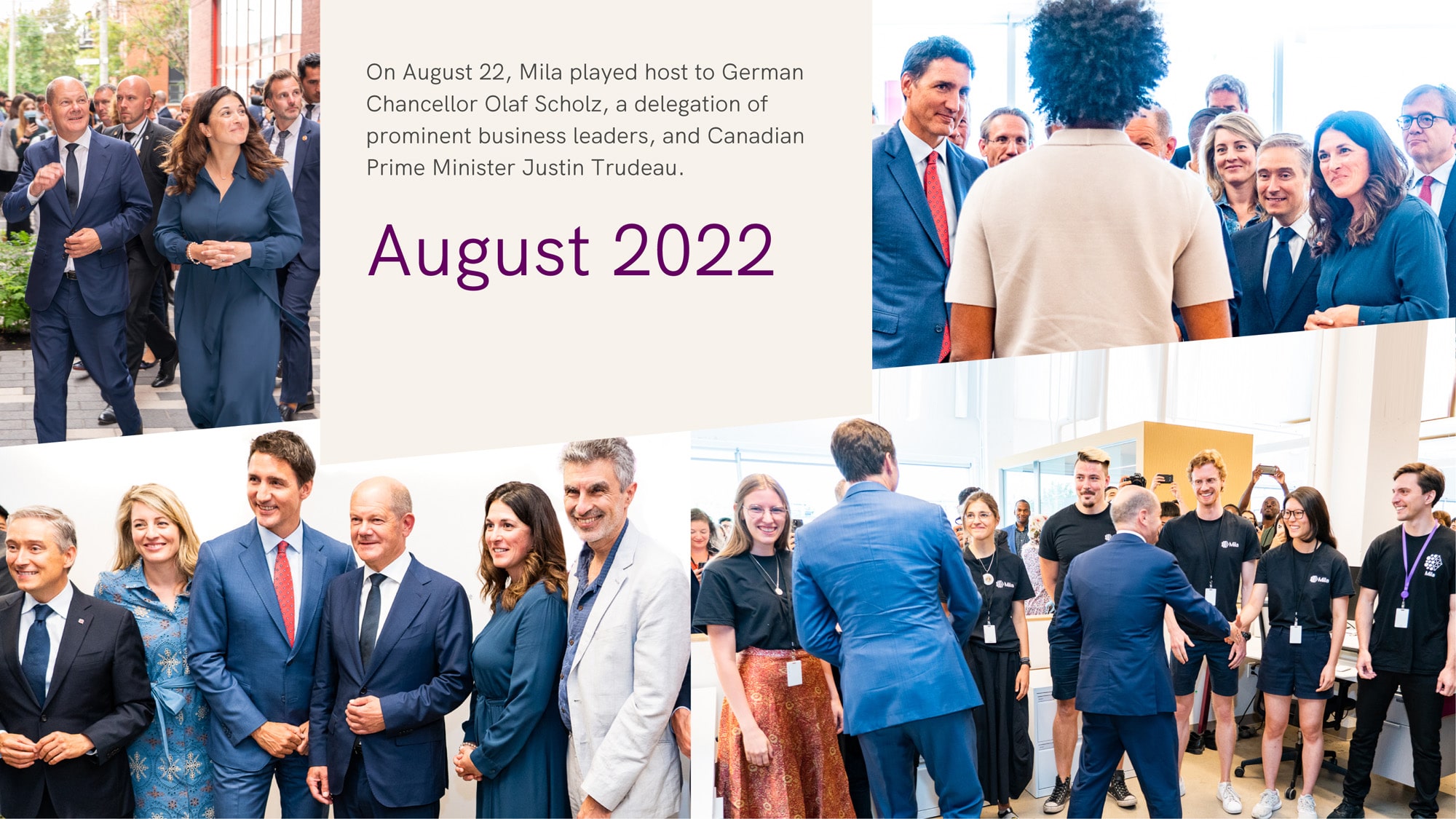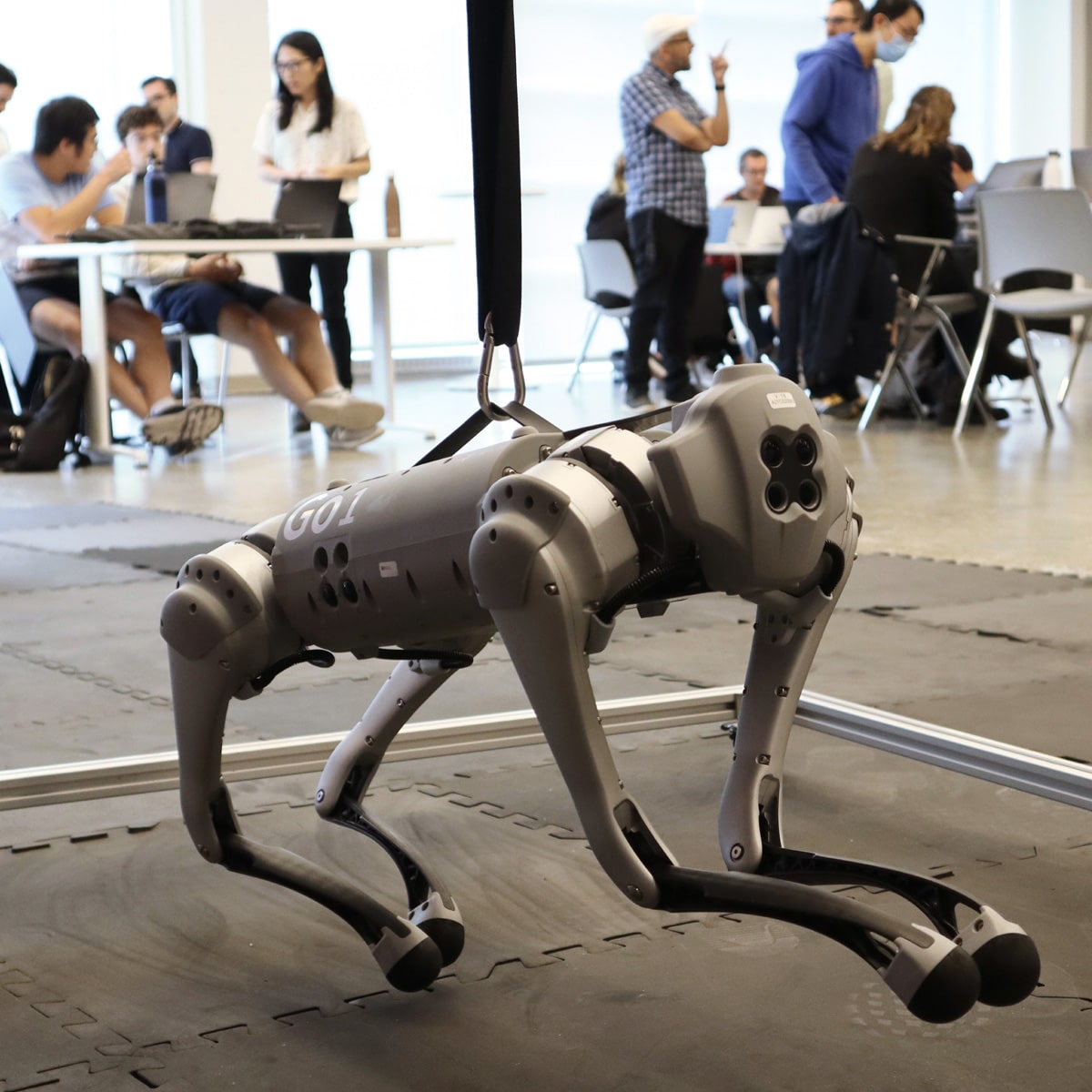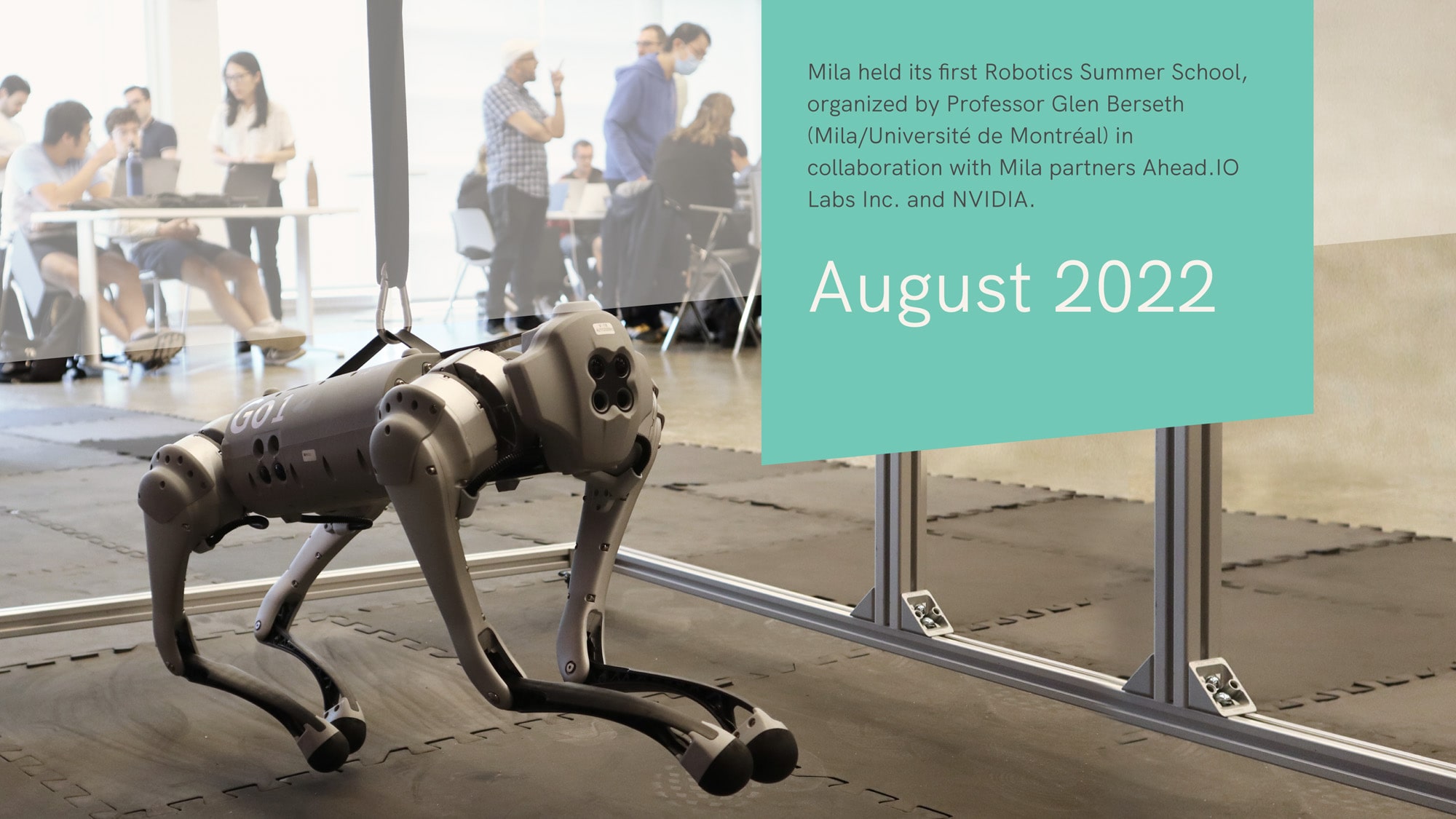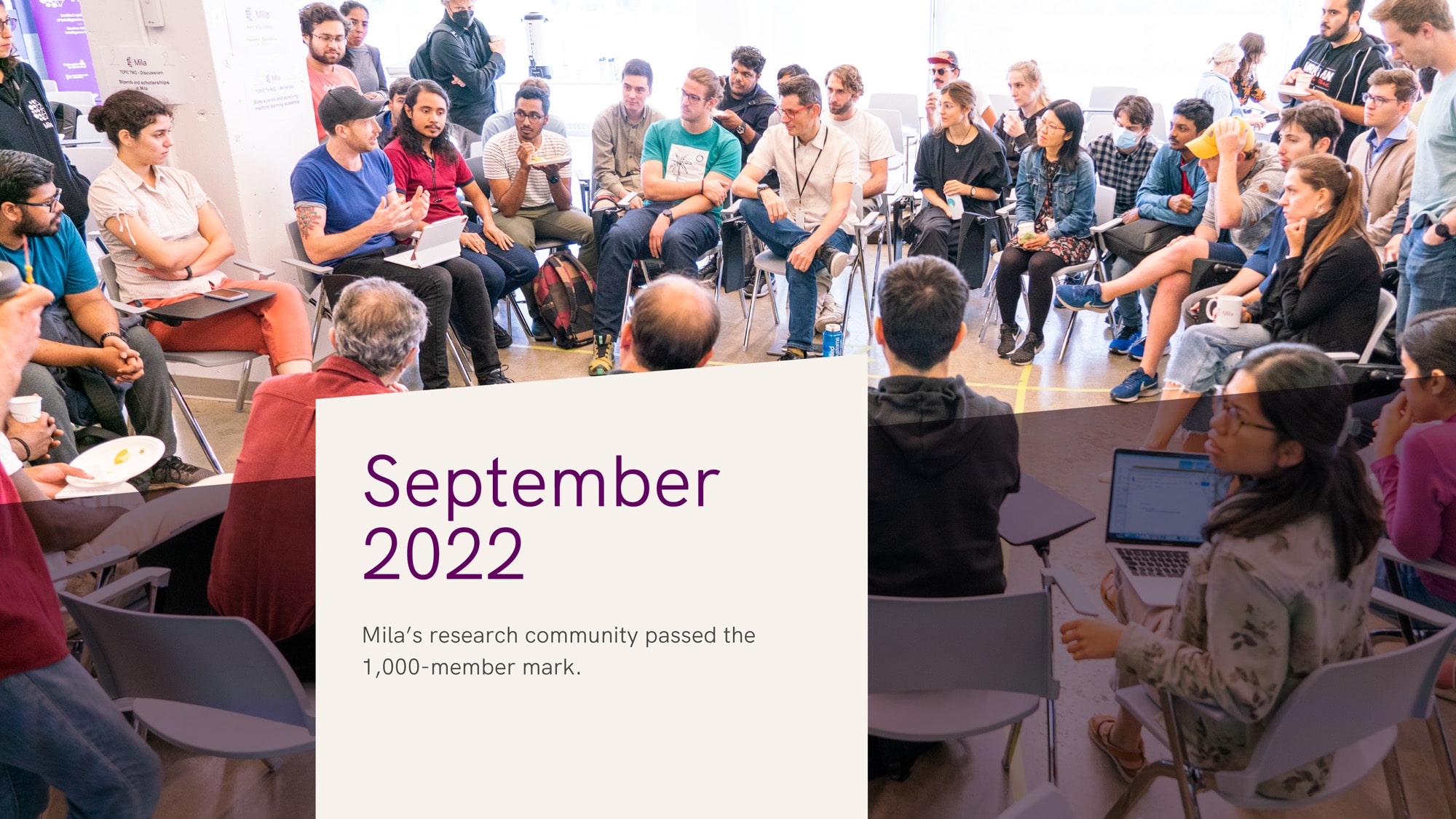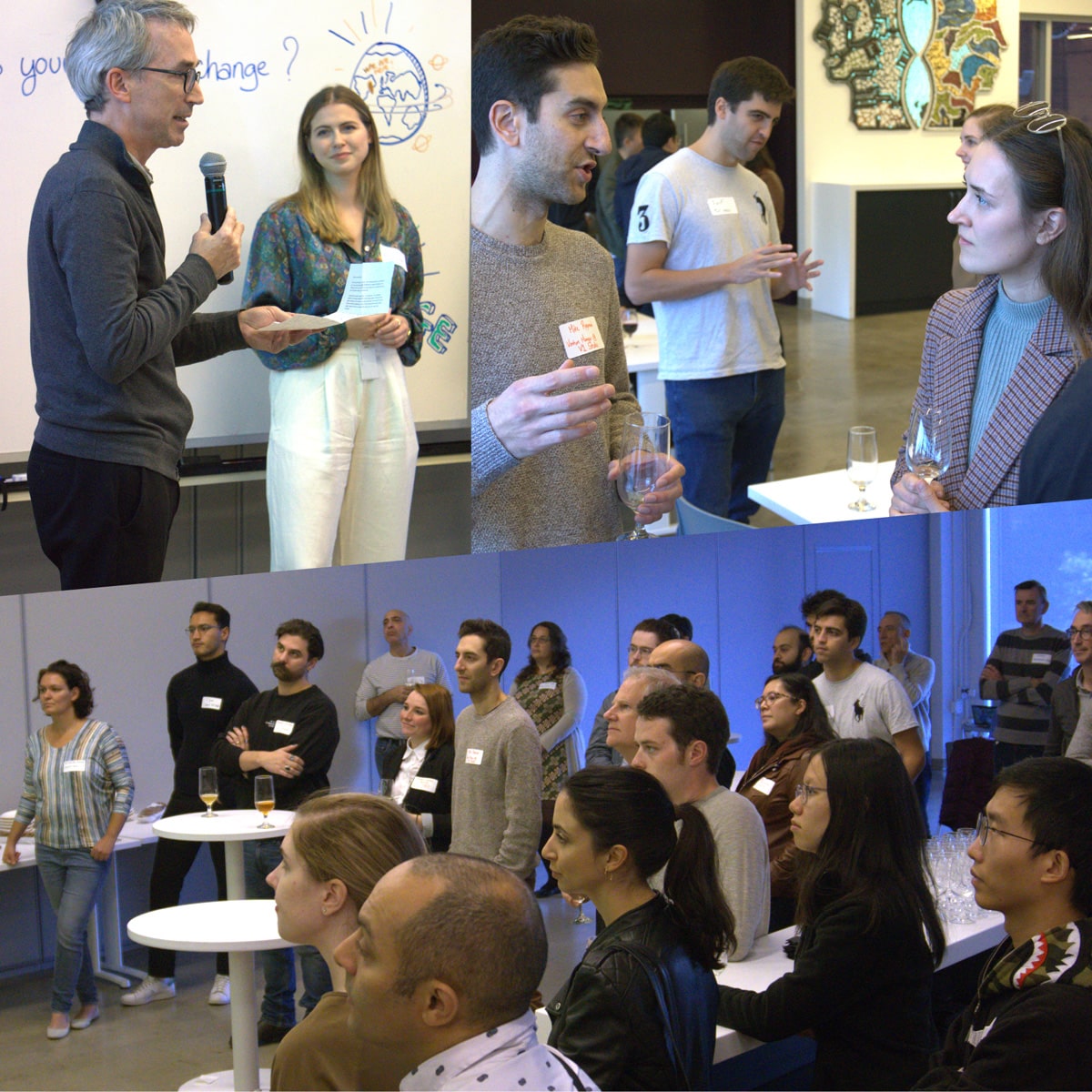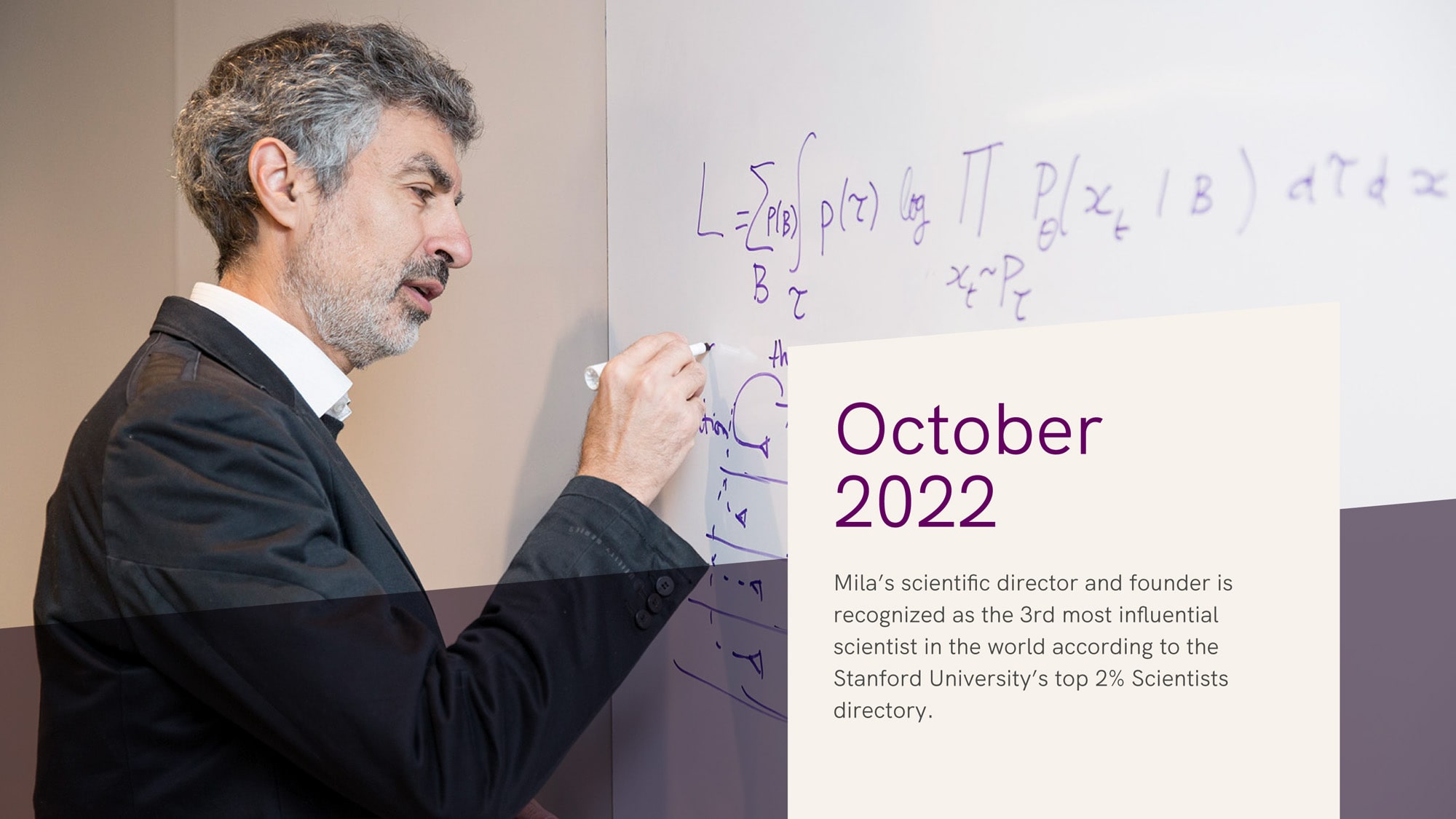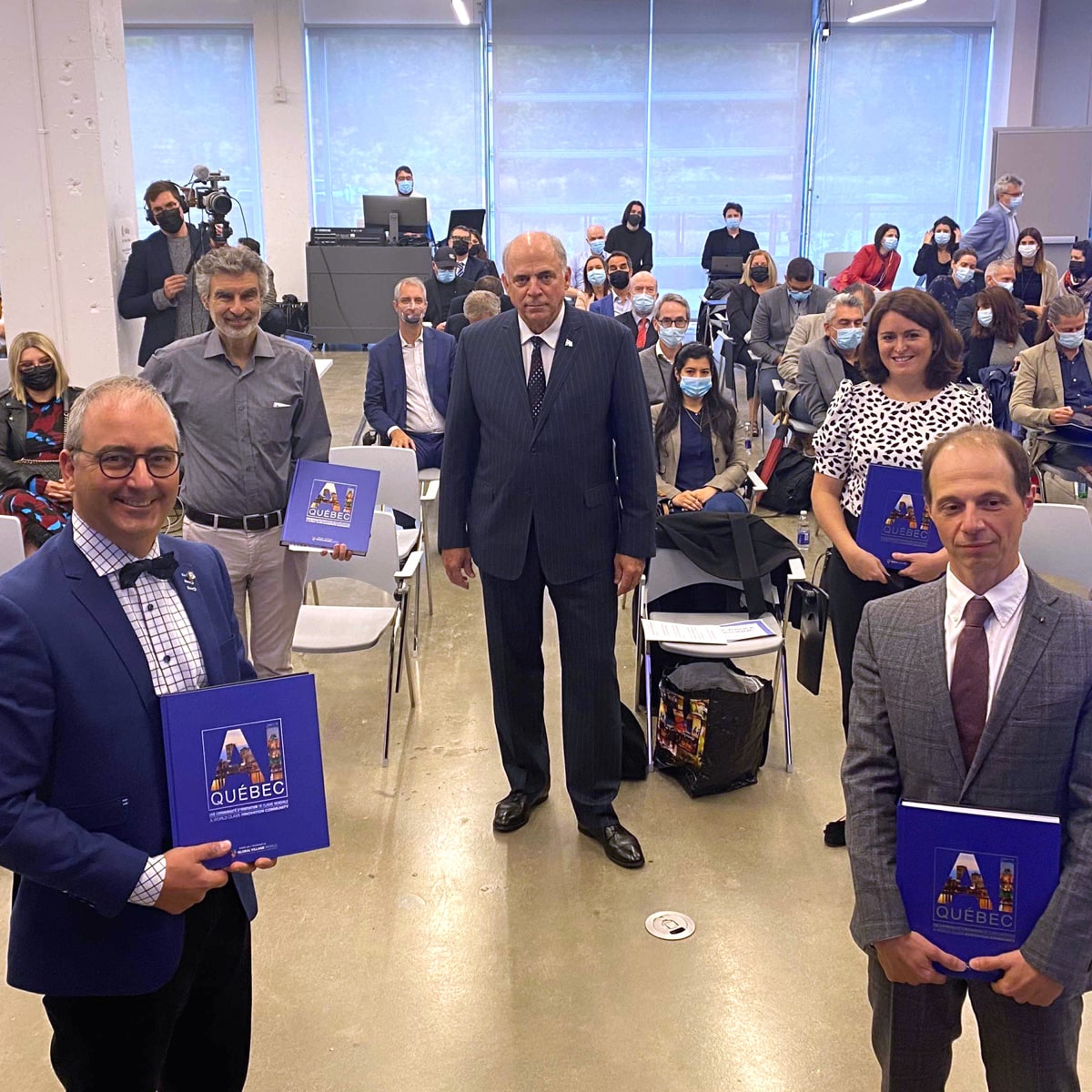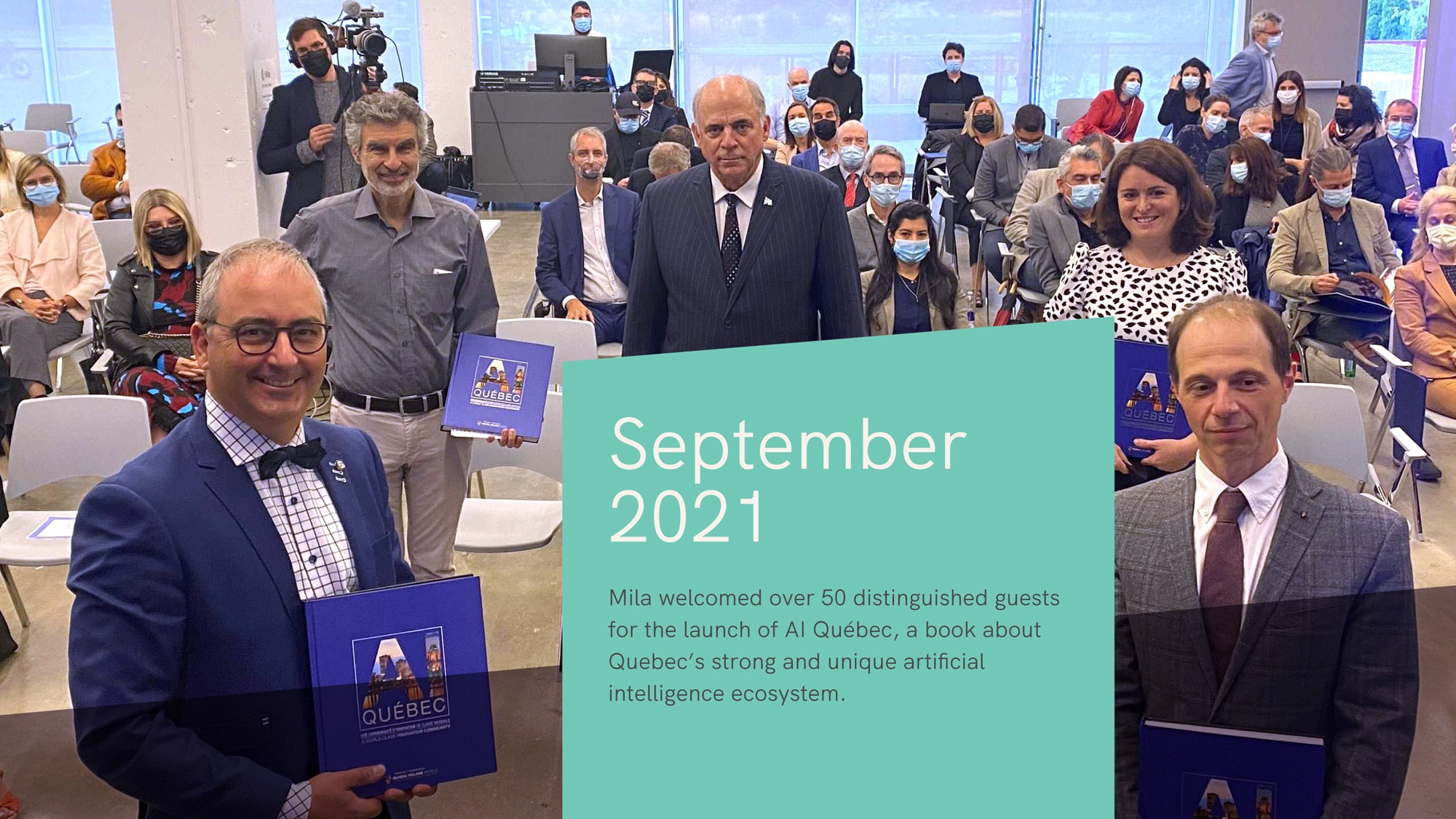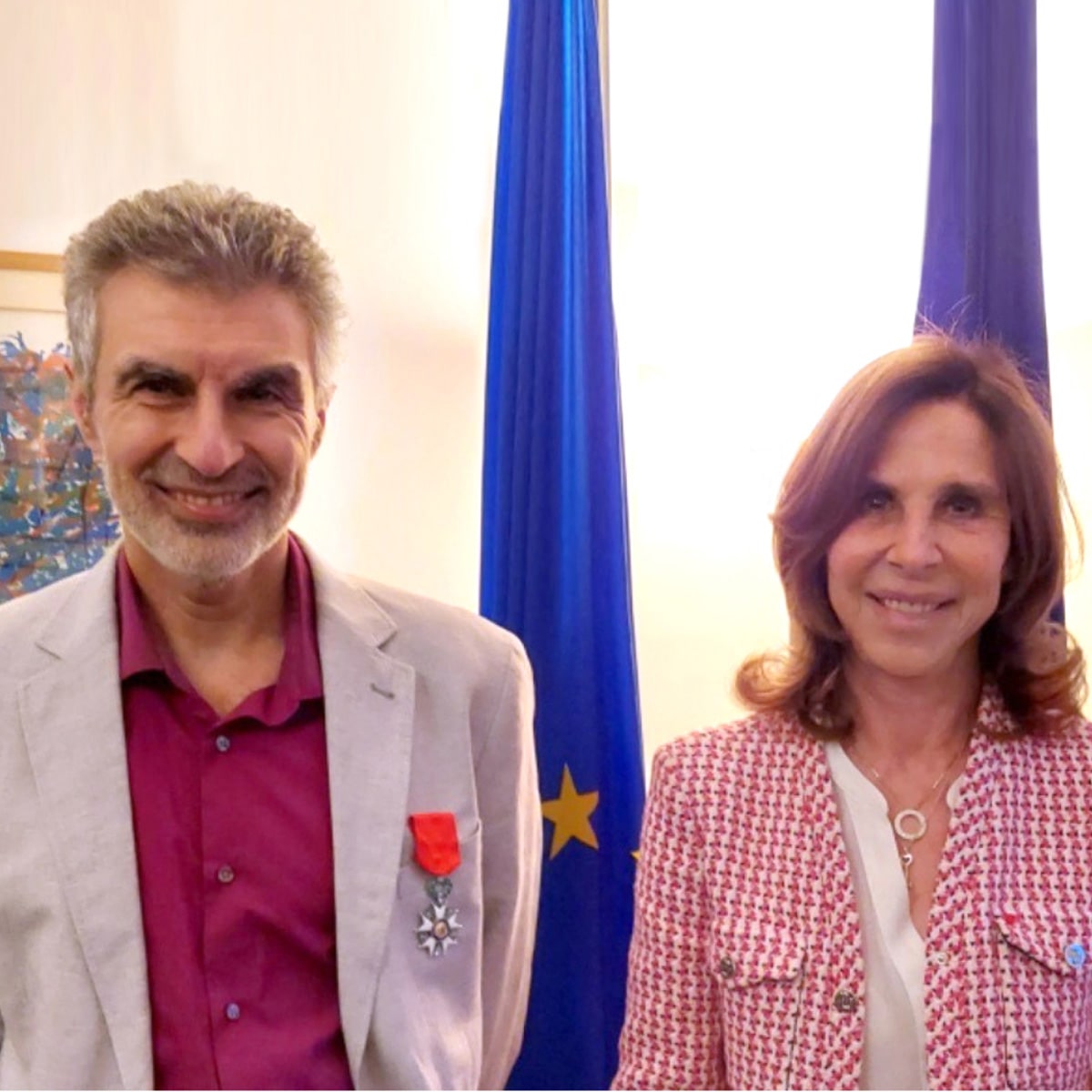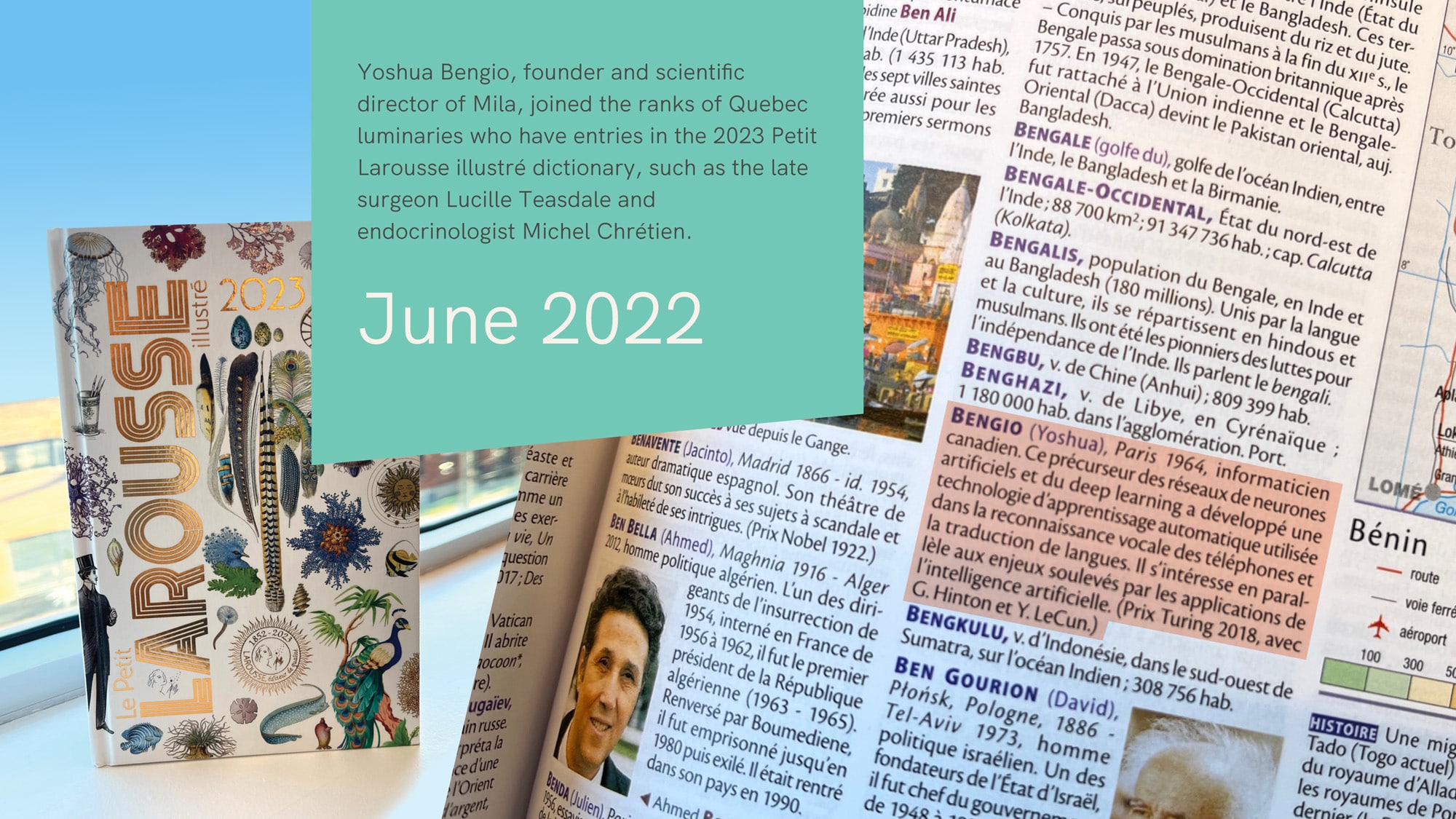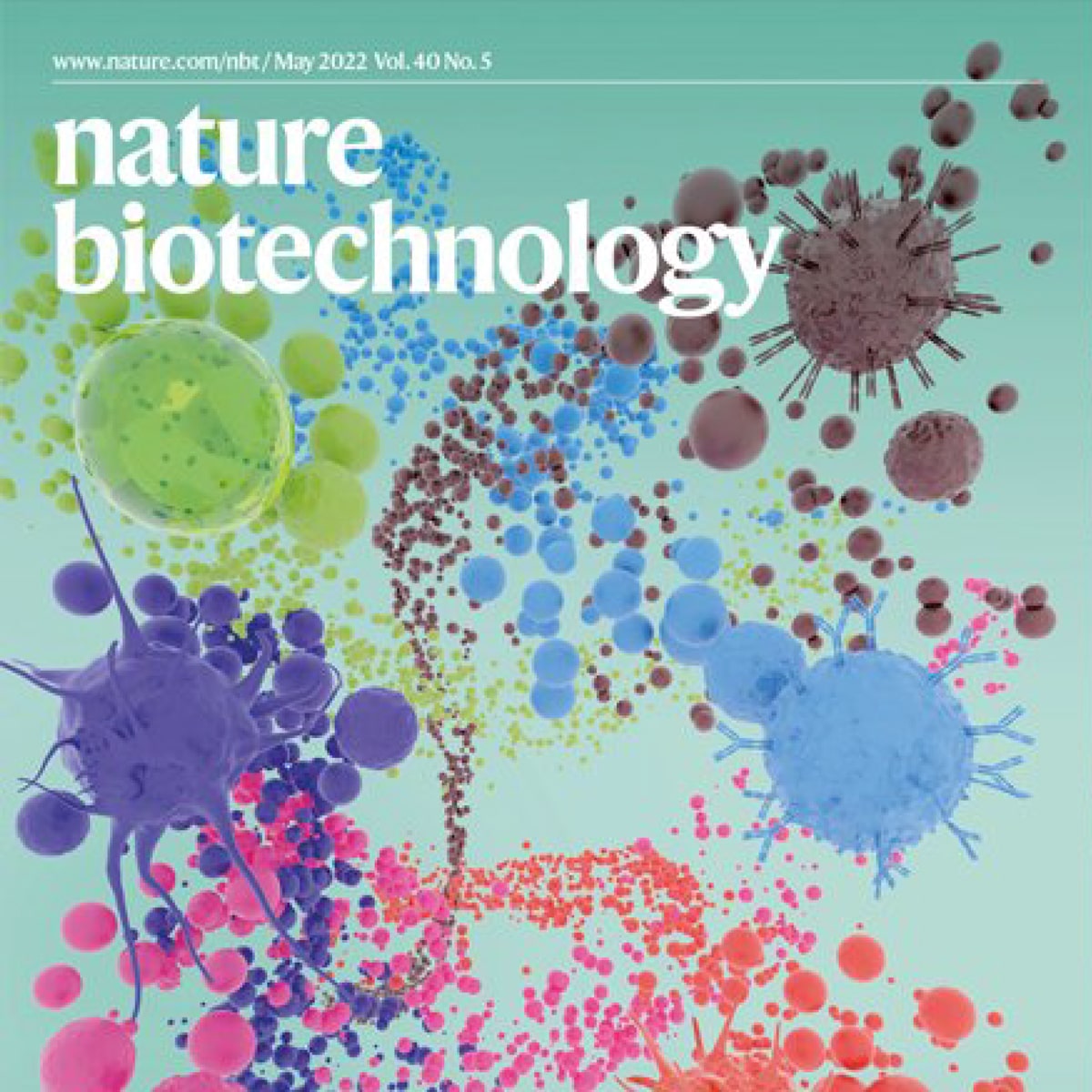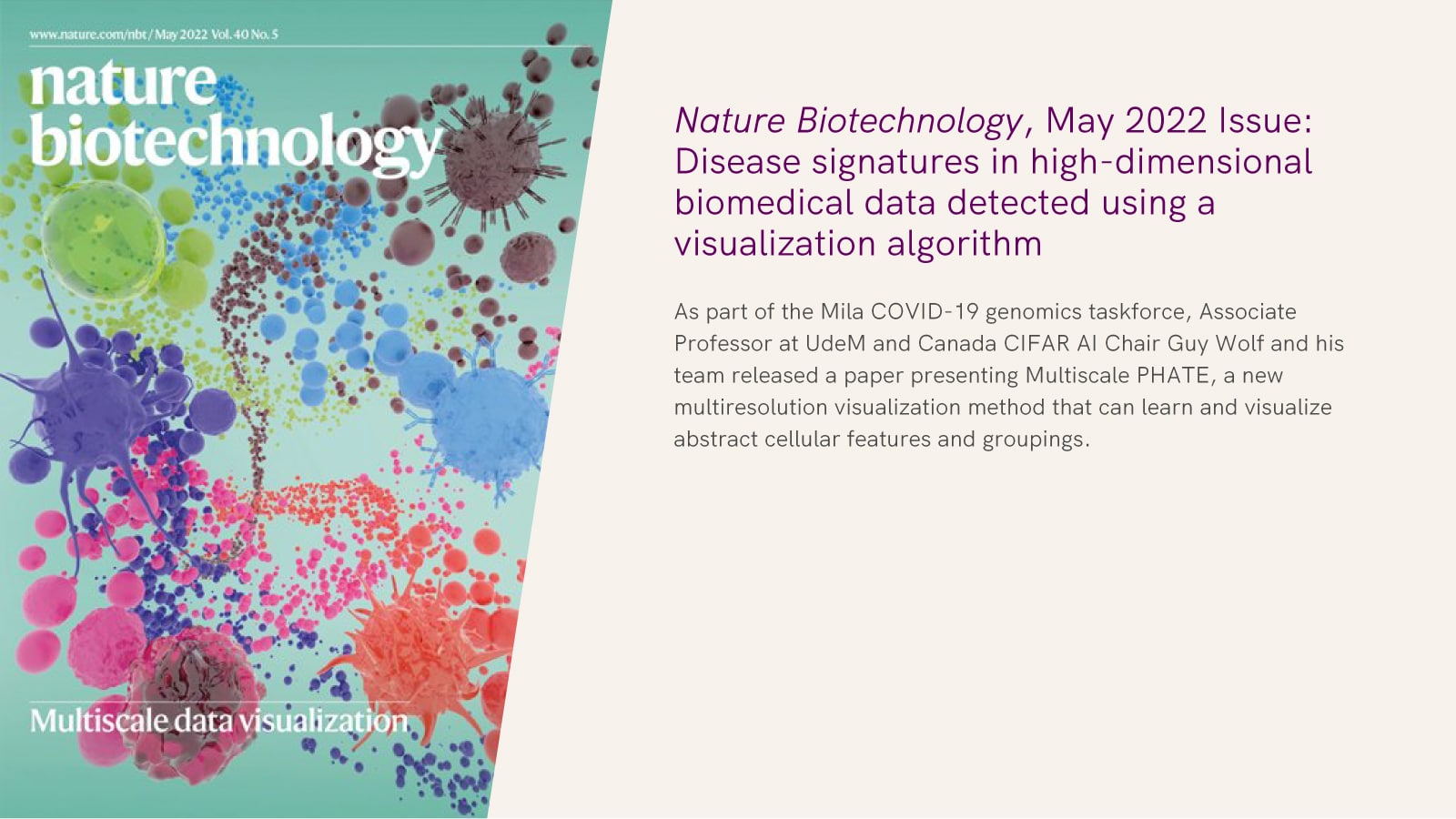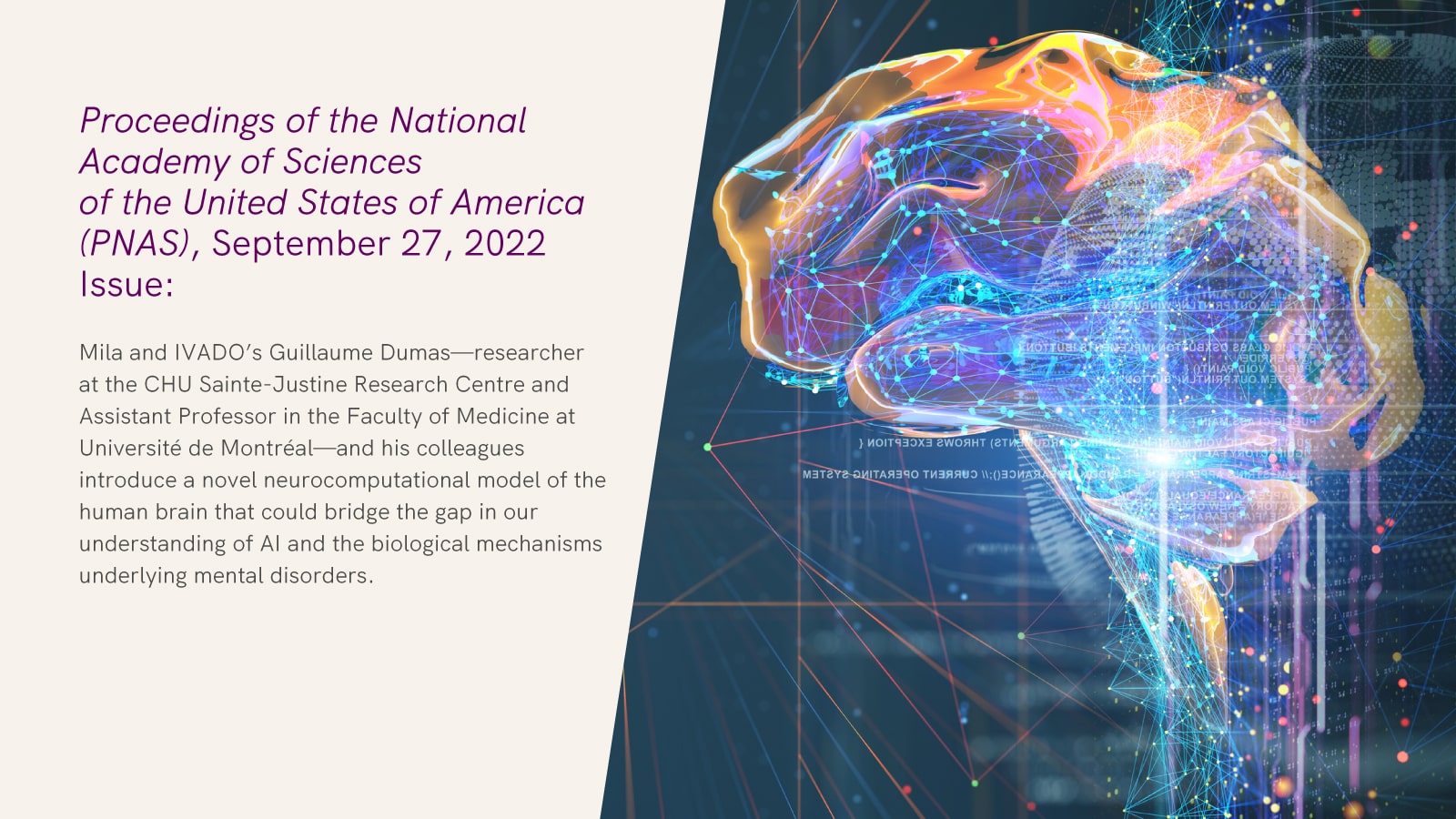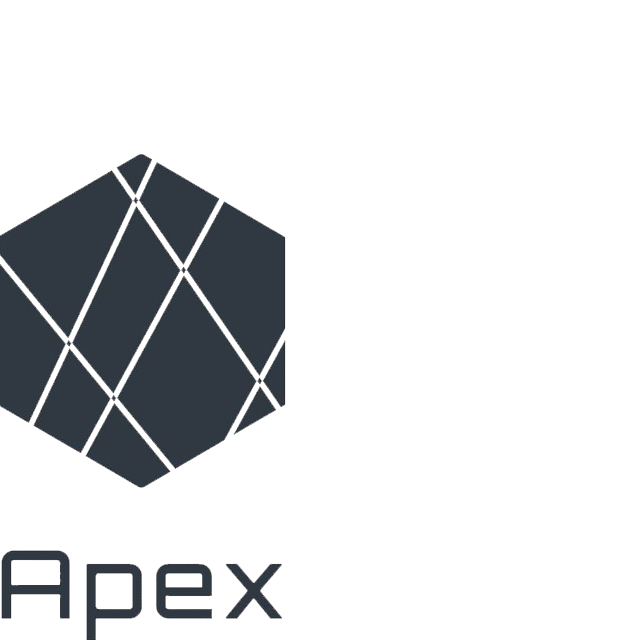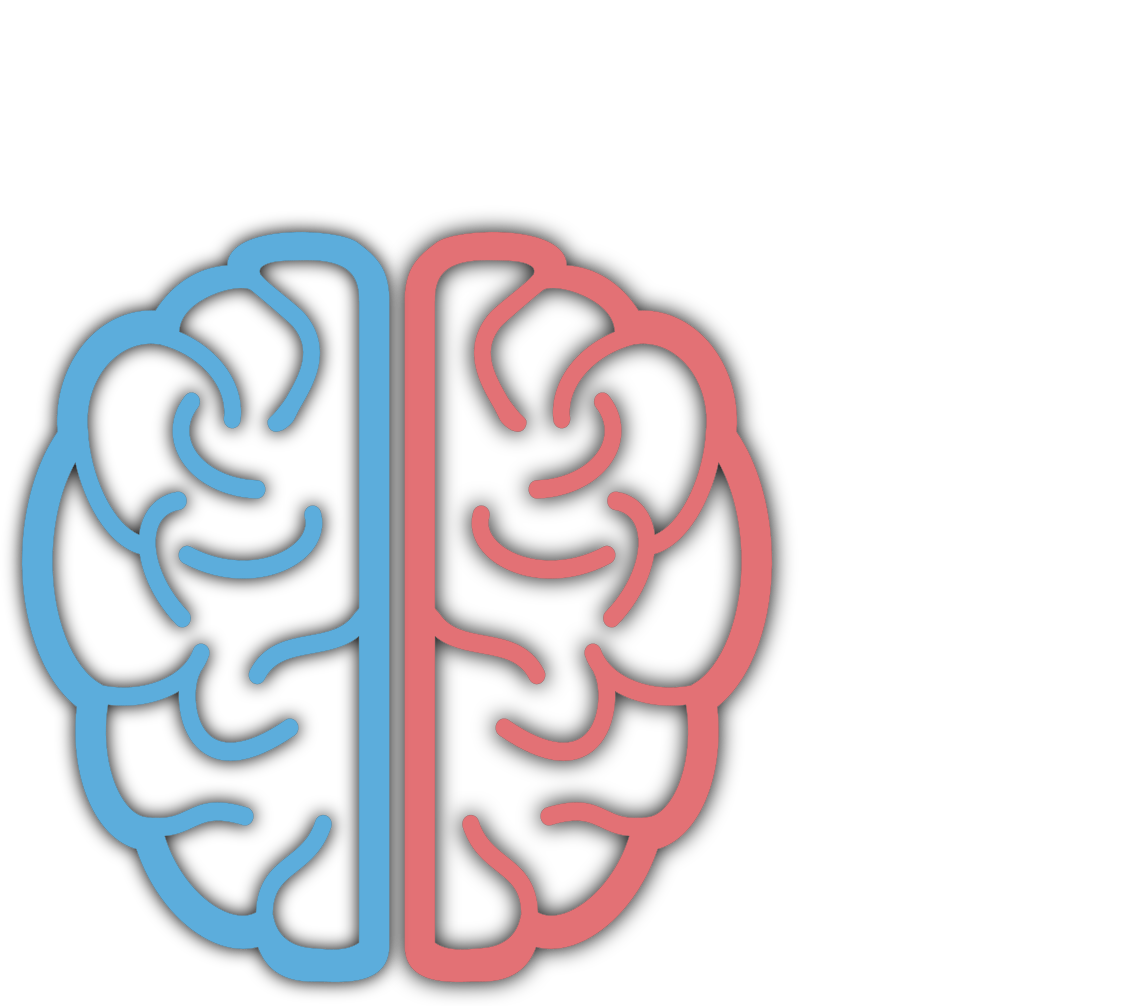Impact Report 2021-22
Impact
report 2021-2022
Purposeful AI. Global reach.
Opening remarks
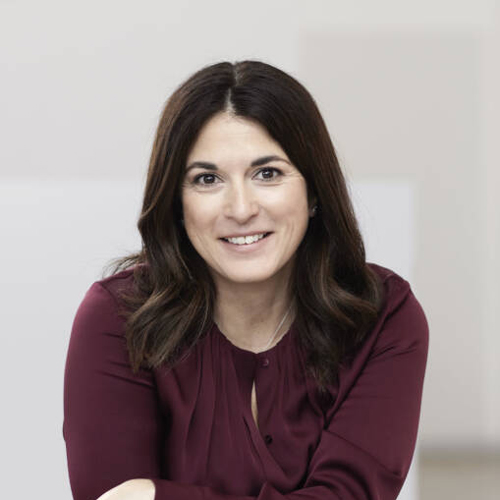
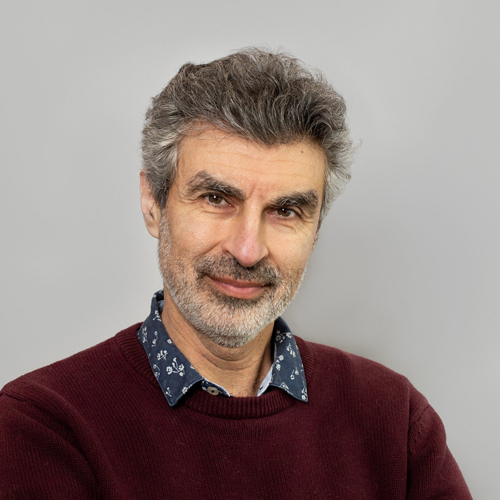

To build a world-class scientific hub in Montreal that would spur innovation and the development of artificial intelligence (AI) for the benefit of all: that was our ambitious goal when Mila was founded nearly five years ago. We believed we could develop a distinctive ecosystem here in Montreal, propelled by a combination of renowned researchers, a new generation of talent from around the world, and staff dedicated to the achievement of a grand vision.
In just a few years, our community has grown to over a thousand researchers and more than a hundred professors. Together, they are exploring some of the most promising avenues for the development of AI and the acceleration of its application.
Our community is pouring its efforts into exploiting scientific and technological progress to tackle some of the big questions of our age. For example:
- Over the last three years, we have been reminded of the importance of health research. Many of our researchers are focused on this field, particularly the use of AI to accelerate drug discovery;
- The environment and the fight against climate change are existential challenges. Our research teams are working on issues such as better planning of energy distribution and making cities more efficient and resilient;
- In a fast-changing economic landscape, AI adoption by local businesses and organizations is a key driver of competitiveness that enables the implementation of forward-looking solutions;
- Ethical issues are of fundamental importance in AI, which is why our AI for Humanity group works closely with leading international organizations to develop appropriate frameworks for the responsible use of AI. In particular, we have developed a unique training program in responsible AI development for our researchers. It will soon be open to key players in industry and civil society.
These are just a few examples of our determination to ensure that the cutting-edge research done at Mila has a tangible impact on our community and the world.
More than ever, this approach and these values are resonating outside our walls and beyond our borders. We had the honour of hosting German Chancellor Olaf Scholz during his diplomatic visit to Canada. Accompanied by Prime Minister Justin Trudeau, the German delegation of ministers and some of the country’s most influential business leaders met with our researchers to learn more about our programs, our culture and our AI ecosystem, which has become the envy of the world. Within the past few months, dozens of delegations of political and business leaders have visited our facilities to find out about our unique approach.
Canada and Quebec are now recognized around the world for their AI leadership. The renewal of Canada’s and Quebec’s AI and innovation strategies is another development that lets us look to the future with confidence as we pursue our mission and enter the next chapter in our history, proud of the road we have travelled and excited about the path that lies ahead.
Valérie Pisano, President and CEO
Yoshua Bengio, Founder and Scientific Director
Pierre Boivin, Chairman of the Board of Directors
Scientific leadership
Students and researchers
As of September 2022, Mila counts more than 1,000 researchers (master’s, doctorate and postdoctorate, interns and visiting researchers) and students (professional master’s, DESS).
Scholarships
349 Mila researchers have received grants and scholarships since 2021, a 21% increase compared to the previous year.
Research projects
Research projects involving Mila-affiliated faculty members jumped from 321 to 447, a 39% increase.
Faculty members
Mila has seen consistent and substantial growth among its faculty, reflecting its ability to attract talent and create a thriving research community.
Peer-reviewed articles
From April 2021 to March 2022, Mila researchers published 547 peer-reviewed articles, 35% of which were co-authored by industry collaborators.
Mila Employees
Since 2021, the number of employees supporting Mila’s research activities and operations grew from 71 to 105, representing a staggering 48% increase.
Five new Canada CIFAR AI Chairs
Awards and distinctions
Mila professors have garnered prestigious awards and nominations for excellence over the past year:

McGill Associate Professor Doina Precup—Canada CIFAR AI Chair, Research Lead at DeepMind in Montreal and Mila Core Academic Member—named Fellow of the Royal Society of Canada for her fundamental contributions to reinforcement learning and her contributions to the use of machine learning (ML) in medicine that have made a difference in practice.
In 2022, Mila’s Founder and Scientific Director Yoshua Bengio was named a Chevalier de la Légion d'honneur—the highest French order of merit—for his outstanding scientific contributions and his commitment to the development of responsible AI. Professor Bengio was also named recipient of Spain’s Princess of Asturias Award for Technical and Scientific Research.
Golnoosh Farnadi, Canada CIFAR AI Chair, Mila researcher and Assistant Professor at HEC Montréal, received the Google AI Research Scholar Program Award in April 2021 for her research addressing algorithmic fairness in decision-focused deep learning. She also won the Facebook 2021 Research Award for Privacy Enhancing Technologies for her project on fair and privacy-friendly ad targeting using federated learning.
This past January, Mila and UdeM Assistant Professor Guillaume Lajoie was named a Tier 2 Canada Research Chair in Neural Computation and Interfacing. In October 2021, Professor Lajoie was awarded the prestigious Simons Collaboration on the Global Brain Pilot Award for a joint project with the University of Washington that explores the use of brain-machine interfaces to uncover computational principles of motor behaviour learning.
In September 2021, Karim Jerbi—Full Professor at Université de Montréal and Canada Research Chair in Computational Neuroscience and Cognitive Neuroimaging—was inducted into the Royal Society of Canada in recognition of his outstanding research at the intersection of neuroscience and AI.
Seven mila professors ranked among the world's most influential AI scholars
Compiled annually by AMiner web service, the AI 2000 Most Influential Scholars list recognizes outstanding technical achievement in AI that has had a lasting contribution and impact:
- Jian Tang – Third in the world for information retrieval and recommendation, also among the top experts for data mining
- Yoshua Bengio – Recognized in three categories (machine learning, natural language processing, speech recognition)
- Marc Bellemare – Listed in the top five in the field of AAAI/IJCAI. Pierre-Luc Bacon and Joëlle Pineau are also recognized as world experts in this category
- Liam Paull listed among the top researchers in robotics
- Aaron Courville is considered one of the elite researchers in machine learning

Mila at ICML: Social event promoting NLP for African Languages
Bonaventure Dossou, a research intern at Mila from Jacobs University Bremen in Germany, co-organized a social event at the 2022 International Conference on Machine Learning to increase African presence at top-tier AI conferences and bring these novel technologies to Africa.
“African languages are considered low-resource languages, which reduces the discoverability of meaningful African works, research and authors. We need to create and work on an ecosystem that favours the development of AI in Africa. AI is a revolution that we cannot miss.”
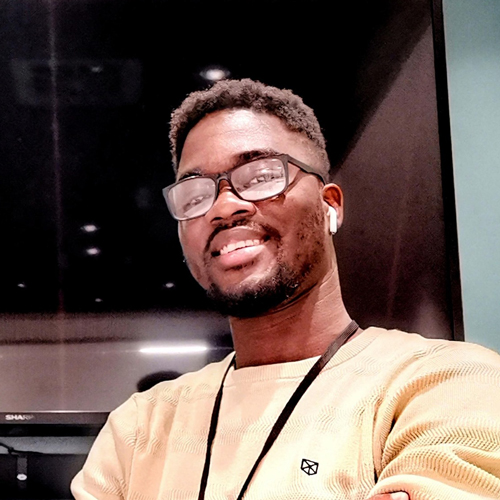
Introducing the next generation of AI leaders at Mila
To spotlight the members of its talented community, Mila launched the Life at Mila video series in the spring, featuring laid-back interviews with Mila students. Six videos have been released thus far.
In this instalment, meet Dongyan Lin, a PhD student at McGill University. When she is not exploring Montreal’s parks and enjoying its famous bagels, Dongyan studies how neuroscience and AI can complement and advance one another.
Click here to view the full series. More videos coming soon!
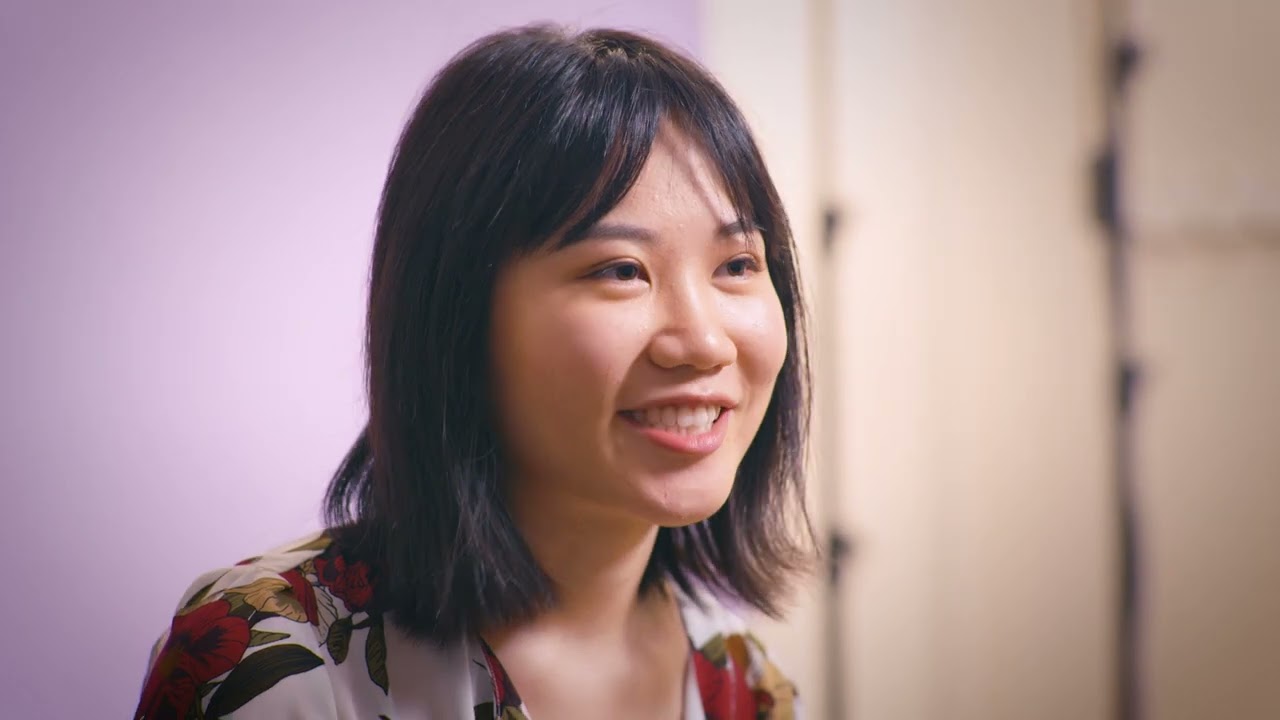
Mila remembers François Laviolette, an AI pioneer in Quebec
In December 2021, Mila and the entire Quebec AI ecosystem mourned the loss of François Laviolette, Full Professor in the Department of Computer Science and Software Engineering at Université Laval, Mila member and Canada CIFAR AI Chair.
“François was recognized in the Quebec scientific community as a pioneer in machine learning research. His leadership and research efforts contributed to establishing the field of AI and health as one of Quebec's most important spheres of artificial intelligence development. In addition to being an admirable colleague and an incredible leader, François was an accomplice with whom I had the chance to build one of the most solid AI ecosystems in Quebec.”


Key player in the Quebec and Canada ecosystems
Mila at the heart of the Pan-Canadian AI Strategy
In June 2022, the government of Canada launched the second phase of the Pan-Canadian Artificial Intelligence Strategy, bolstering Canada’s leadership in the sector.
This second phase of the Strategy, which received an investment of more than $443 million in the 2021 Budget, will enable Mila and the entire Canadian AI ecosystem to attract world-class talent, increase its capacity for cutting-edge research, and drive the commercialization and adoption of AI, while ensuring that ideas and knowledge developed in Canada continue to be implemented locally.
AI, a central component of the SQRI2
In May 2022, the Quebec Ministry of Economy and Innovation announced the new Quebec Research and Innovation Investment Strategy (SQRI2), which will invest more than $217 million in AI research and innovation over five years. $125 million will be allocated to support several key areas for Mila: excellence in AI university research, training, implementing AI adoption initiatives in business, AI business incubation and bootstrapping, and ensuring that companies take into account the societal impacts of AI and digital technology.
“The strategies announced by both levels of government are ambitious and focused on promising areas for our society. We strongly believe that we can make a difference by applying research results to the challenges of our time, such as business competitiveness, climate change and healthcare, we can make a difference. We welcome these major strategic investments."

Quebec's AI ecosystem ranks 7th in the world
Due in large part to cutting-edge research and government investment in recent years, Quebec has joined the ranks of the world’s AI leaders. In March 2022, a study by Tortoise Media ranked Quebec 7th in the world in AI, ahead of countries with vastly larger populations such as France, the Netherlands and Australia.
The major investments in AI of recent years in Quebec and Canada are already bearing fruit. According to a study by PwC Canada, they propelled a $1.9 billion increase in the province's GDP between 2017 and 2021; the $800 million invested by the two levels of government have supported an average of more than 3,000 very well-paid jobs per year and generated more than $400 million in tax revenue during the same period.
Quebec's AI expertise, particularly in deep learning, also increases Montreal’s drawing power. According to a July 2022 study published by Montréal International, the sector’s strength was one of the main reasons for the record investments in Montreal by companies based outside Quebec in the first half of 2022.
Transforming Industry
AI is already transforming global economic activity, and Mila is lending its expertise to industry partners across operational activities, from applied research projects to consultations and startup growth.
Industry partners
In 2021–22, the number of Mila industry partners jumped from 84 to 105, a 25% increase.
Canadian partners
Of those 105 organizations, 67 are Canadian.
Partners from the health and life sciences sector
23% of Mila’s industry partners belong to the health and life sciences sector.
AI Activation Program Launch
This past June, Mila launched its AI Activation program to help organizations, including small and medium-sized businesses, begin the process of adopting high-level machine learning.
Through advisory mandates spanning a few months, our applied machine learning scientist teams guide organizations towards the advanced use of AI to improve their productivity, generating positive impacts on society.

In the summer of 2022, Alloprof and Mila collaborated together, harnessing modern deep learning techniques, to improve Alloprof’s Help Zone, an online platform where students can ask a question about their school work and get an answer from another Alloprof user or moderator.
To keep students from getting stuck on a question and giving up on their homework, it’s important to give them help right away when they come to a stumbling block. Thanks to AI, students who ask a question on Alloprof now receive instant individualized support while they wait to receive assistance from a peer or Alloprof’s team.
In summer 2022, Mila’s AI Activation team has done a demonstration for Dubois Agrinovation to show the potential of optimizing their operations in selling parts for farm irrigation systems. Mila developed a computer-vision-based system that lets Dubois Agrinovation’s employees, or their clients directly, quickly identify the spare part needed by their customers using only a photograph of it.
Handling request for parts without this system had been a painstaking process for the company’s employees and their clients. This streamlined process, made possible by Mila's system, can be accomplished by less experienced employees, and even allows Dubois Agrinovation's customers to identify parts on their own, thus enhancing the company's customer experience.
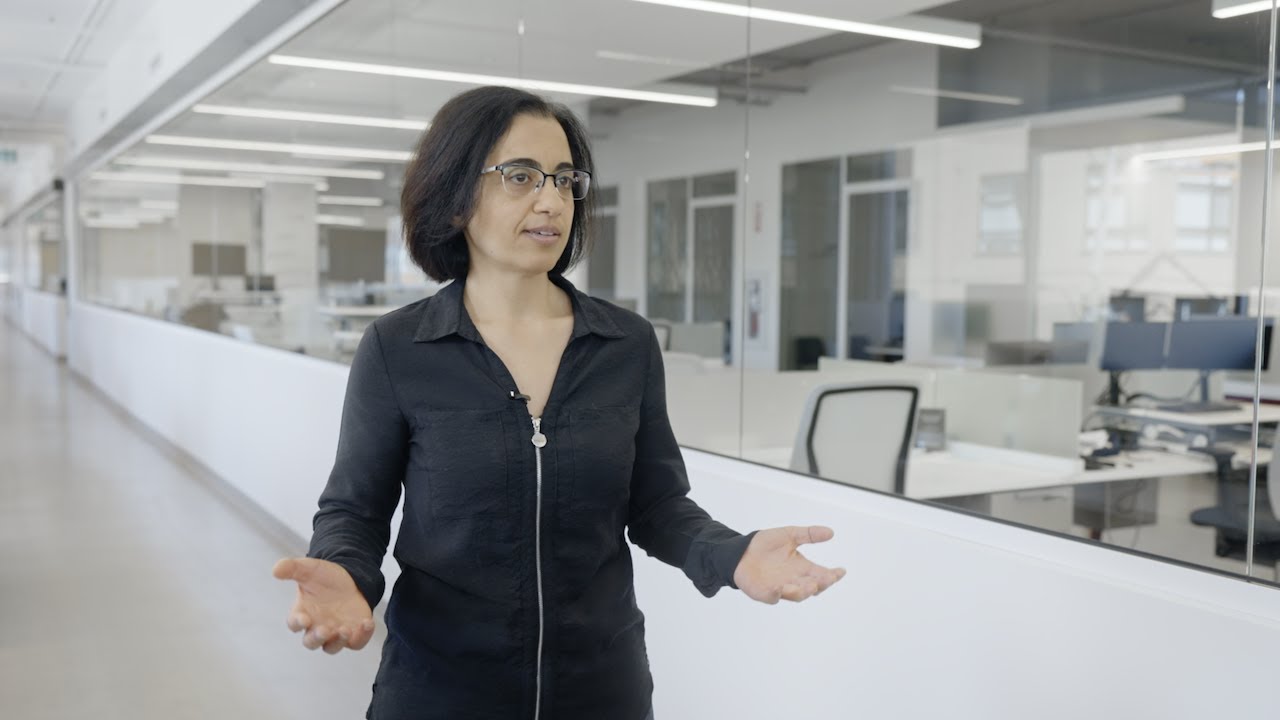
Applied research: From lab to industry
Mila’s Applied Machine Learning Research Team works with organizations on high-impact and challenging machine learning projects. The team's unique collaborative approach aims to design and implement cutting-edge solutions that benefit organizations by enriching their machine learning capabilities.
Since April 2021, 49 companies have benefited from technology transfers. Discover two innovative projects led by Mila’s Applied Machine Learning Research Team:
The World Anti-Doping Agency (WADA) is joining forces with Mila researchers to explore AI-based solutions for improving athlete anti-doping testing strategies. The goal is to optimize testing resource allocation by better estimating an athlete’s doping risk. The resulting solution will be combined with other tools and strategies used by anti-doping organizations to prioritize testing. This collaboration can potentially have a meaningful impact in fighting the use of doping in sports.
With the help of Mila, LUCID built an affective music recommendation system (AMRS) that leverages patients’ self-assessed responses to music. AMRS proposes audio experiences (in the form of track sequences) for patients using a reinforcement learning agent and a model that predicts the average affective response of a generalized anxiety patient to music. The agent selects the music from a list of available tracks based on the listener’s current and final targeted moods. The first version of this technology led to a successful commercial API product for therapeutic platforms now integrated into a globally distributed and clinically validated research iOS/Android app.
Mila Entrepreneurship Lab: Fostering the growth of AI startups
The Mila community is made up of passionate and curiosity-driven researchers with the potential to change the world through AI applications. The Mila Entrepreneurship Lab was launched in 2022 to nurture this entrepreneurial spirit and to support the growth of startups launched by Mila researchers at all stages of development.

The number of startups created by Mila researchers.
The number of startups that were awarded Mila Startup status by the Startups Committee, giving them access to funding, talent and various privileges via the Mila partnership program.
“The Mila ecosystem and startup program enabled us to interact with and learn from other AI startups who are further along while also having access to its rich research community. Given the depth and breadth of the AI talent at Mila, it makes sense for Mila to create and foster an environment that allows researchers to transition into innovators. The success of the first edition of the Entrepreneurship Lab is a testament to this.”
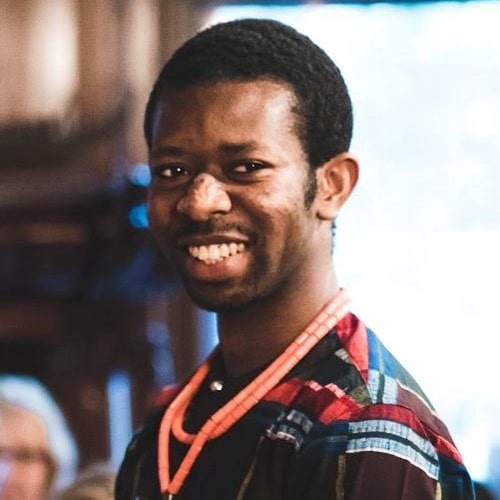
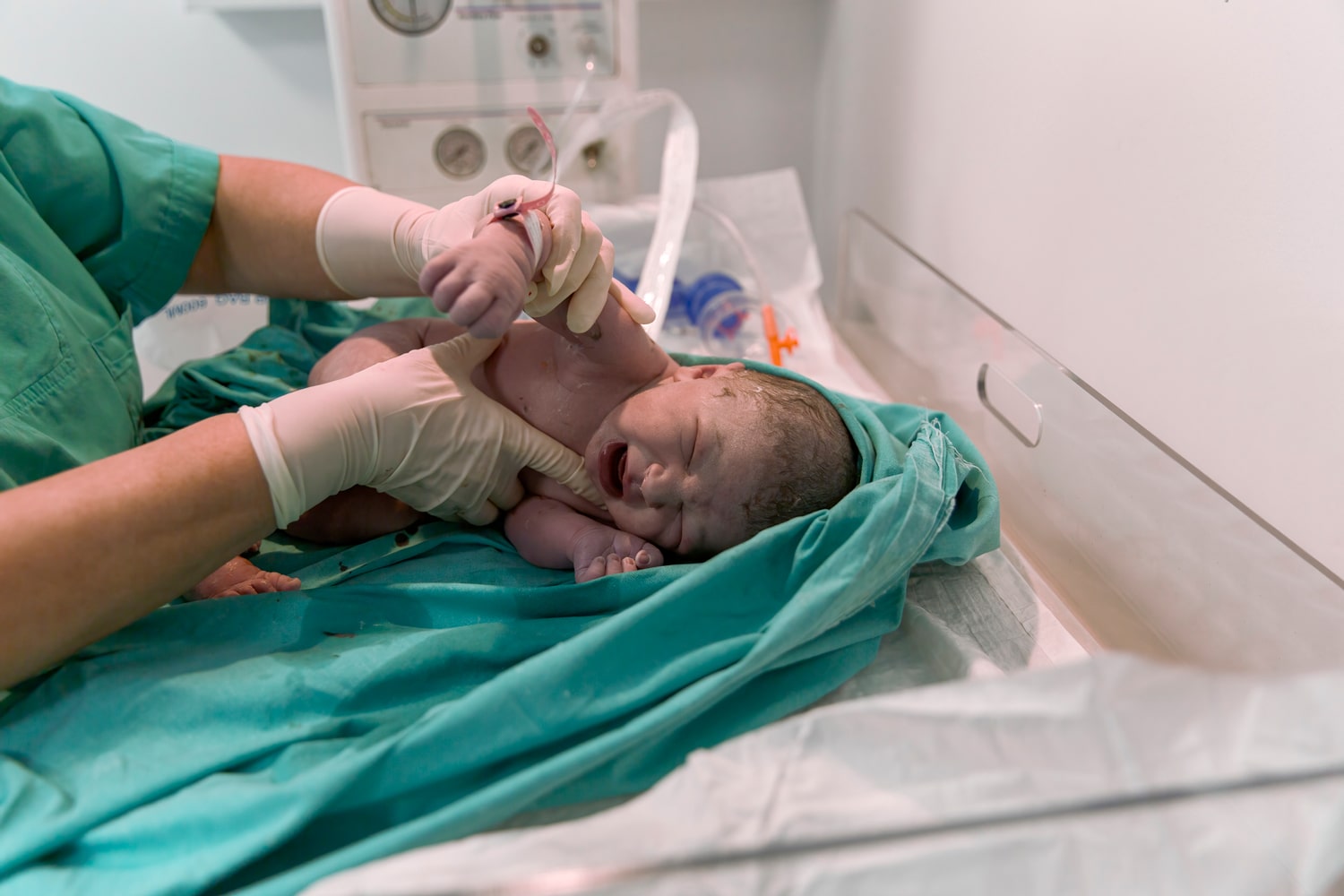
Ubenwa: Leveraging AI and ML to diagnose neurological conditions through baby cries
Mila PhD student Charles C. Onu is the Founder of Ubenwa, a Mila Startup whose mission is to make clinical diagnostic tools more widely accessible.
“Growing up in Nigeria, of all the socioeconomic challenges around me, the deficiencies in healthcare stood out the most. I’ve lost relatives due to simple inadequacies. It was always a question of how I can apply my science and engineering education to improve healthcare, and my path led me to AI.”
In 2022, Ubenwa raised $CAD 3.24 million to launch an app that can decipher baby cries to detect and diagnose medical conditions that have traditionally been difficult to diagnose, such as neurological issues caused by perinatal asphyxia.
Meet the 8 new companies that earned Mila Startup status in 2022:
Aeroport AI
Aeroport AI reduces aircraft preparation time and flight delays by using computer vision and deep learning to monitor and analyze aircraft ground handling in real-time, and provide delay alerts and predictions to optimize apron operations.
Apex
Apex seeks to understand economic and financial interactions through open market dynamics. The company develops large-scale AI-based supply and demand simulators to help decision-makers make more informed decisions at any scale.
Chapa
Chapa is an Ethiopian financial service and data engineering company. Chapa provides merchants and entrepreneurs with solutions for payments and transaction issues.
Mohana
Mohana aims to make it easier for people with lifestyle-related chronic conditions improve their well-being and symptoms. The startup product is designed around the key stepping stones of how one would work with a nutritionist or a naturopath.
SilicoLabs
SilicoLabs is a company conducting behavioural research to enable scientists to leverage emerging technologies, within a framework designed for interdisciplinary research and collaboration.
Raiv Computers
Raiv Computers is a neurotechnology startup developing advanced machine learning and AI tools to improve neural therapies using brain-machine interfaces and deep brain stimulation.
Unser Dialog
Unser Dialog provides a dialogue forum where controversial topics can be discussed in a fruitful and empowering manner. Its mission is to make AI knowledge accessible for everyone, empowering and including citizens in AI decision-making.
DreamFold
DreamFold aims to find cures for diseases such as diabetes and cancer with technology based on high throughput biological experimentation, active learning and GflowNets to enable the design of antibodies that target membrane proteins and transmit the signal directly into the diseased cell.
Developing impactful partnerships
In 2021, Mila and UdeM Professor and Canada CIFAR AI Chair Aaron Courville worked closely with the Japanese-based multinational conglomerate Hitachi to help optimize transit system scheduling in Japan through reinforcement learning. Professor Courville's guidance helped Hitachi improve its internal model.
In spring 2022, David Rolnick, Assistant Professor at McGill University and Canada CIFAR AI Chair, helped the Montreal Insectarium develop sensor systems based on machine learning to automatically photograph and identify insects.
These systems allow the Montreal Insectarium to analyze biodiversity in remote locations for which very little data exists, monitor ecosystem health and assess the impacts of climate change on these ecosystems.
In 2021 and 2022, Mila established partnerships with several leading financial institutions, including Desjardins, the largest financial cooperative in North America, BDC, the bank for Canadian entrepreneurs, and the Caisse de dépôt et placement du Québec (CDPQ), a global investment group. Through these agreements, partner institutions are able to extend the benefits of Mila’s cutting-edge research and expertise to startups in their respective networks.
“These partnerships allow us to welcome leading financial institutions to our community while opening opportunities to build relationships with many SMEs that have great AI potential.”

AI for the benefit of society
The development of socially responsible AI for the benefit of all is at the heart of Mila’s mission. As a leader, Mila contributes to social dialogue and the development of applications that will benefit society through collaborations between researchers and stakeholders with diverse skills who want to harness the potential of AI and advanced technologies to create a better world.

Announcing AI for Humanity's new Public Policy and Learning stream
The new Public Policy and Learning stream within the AI for Humanity team aims to raise awareness of and capacity for responsible AI practices across the AI ecosystem by developing training programs, consulting services and practical resources for Mila students, partners and startups.
The team will also build Mila’s public policy capacity to lead national and international discussions on AI regulation and governance by upskilling and convening policymakers worldwide and collaborating with global organizations like GPAI, UNESCO and UN-Habitat.
“I am energized by the incredible talent and strong values in the Mila community and will use my policy and learning design background to create an inclusive space for learning across disciplines and advance policy ideas.”

Launched in 2020 as a brainchild within the G7, GPAI is an international multi-stakeholder organization comprised of 25 member countries. GPAI aims to bridge the gap between theory and practice to advance responsible AI research and development. Discover how Mila researchers contribute to GPAI’s mission:
- GPAI’s Working Group on Responsible AI: Serving as Co-Chair of the working group, Mila/UdeM Professor Catherine Régis ensures that the group fosters and contributes to the responsible development, use and governance of human-centred AI systems, in accordance with the UN Sustainable Development Goals.
- GPAI Drug Discovery Committee: Yoshua Bengio, Mila’s Founder and Scientific Director, co-leads the organization’s Drug Discovery Committee. This committee engages international stakeholders in the development of a more equitable, accessible and impactful drug R&D system, powered by AI.
This fall, the AI for Humanity team launched TRAIL, a new interactive development program exclusively for Mila students. This year’s cohort is at full capacity. Over the course of five weeks, TRAIL will equip researchers with the foundational knowledge, skills, language and tools they need to design, implement and maintain AI research projects responsibly.
“Members of our community carry Mila’s shared values of responsible AI and social conscience in many ways. TRAIL is a tool to ensure we meaningfully consider the implications of AI and embed ethical research practices into our culture and mindset.”
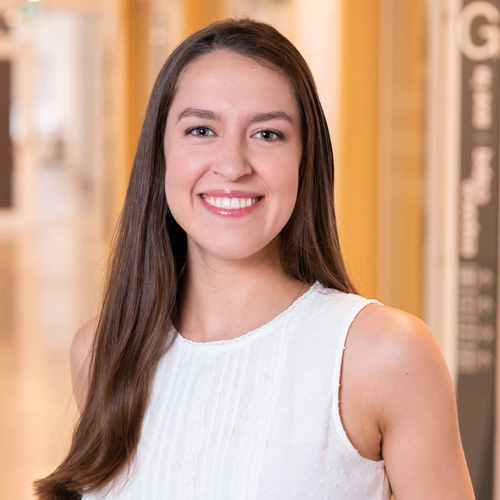
In October 2022, Mila and UN-Habitat partnered up to present the “AI & Cities: Risks, Applications and Governance” white paper at the Urban Economy Forum in Toronto. The report, which focuses on AI strategies, risks and specific approaches to and tools for urban AI governance, puts forward a set of key recommendations for urban leaders when implementing AI in local governments. More importantly, it emphasizes the importance of applying a people-centric and climate-sensitive approach to AI deployment in cities and human settlements. Click here to read the full white paper.
Data-driven Insight for Sustainable Agriculture (DISA) is a computer vision project focused on demonstrating the utility of regenerative agricultural practices to inform policymakers and promote these practices among smallhold farmers in Rwanda, with a special focus on female farmers. This project is designed to mitigate climate change by enhancing carbon sequestration while increasing food security, employment and income for the benefit of 9.2 million smallhold farmers. This ongoing project is led by Mila Applied AI Projects Lead Allison Cohen, Director of Applied Research Gaétan Marceau Caron, and PhD student Mélisande Teng. External collaborators and experts include Future Earth and Sustainability in the Digital Age; Planet, a global daily Earth data provider; and local stakeholders from ESRI Rwanda and Leapr Labs.
Launched in 2018, the Montreal Declaration is a collective work that aims to steer the ethical development of AI for social good by making recommendations with strong democratic legitimacy. Today, an initiative led by Université de Montréal—with contributions from Mila's AI for Humanity team—is assessing the activities of the Declaration since its unveiling to assess how it may have shaped and informed responsible AI initiatives. The goal is to understand the ecosystem's needs in this area and provide future recommendations. The report is set to be released in fall 2022.
AI and Health: Anything is possible
Mila distinguished itself on the health front in several ways during the past year, largely as a result of the creation of a unit that develops health-related initiatives. It includes more than 35 world-renowned professors whose research interests lie at the interface between AI and the life sciences, ranging from bioinformatics and medical machine learning to neuroscience and oncology.
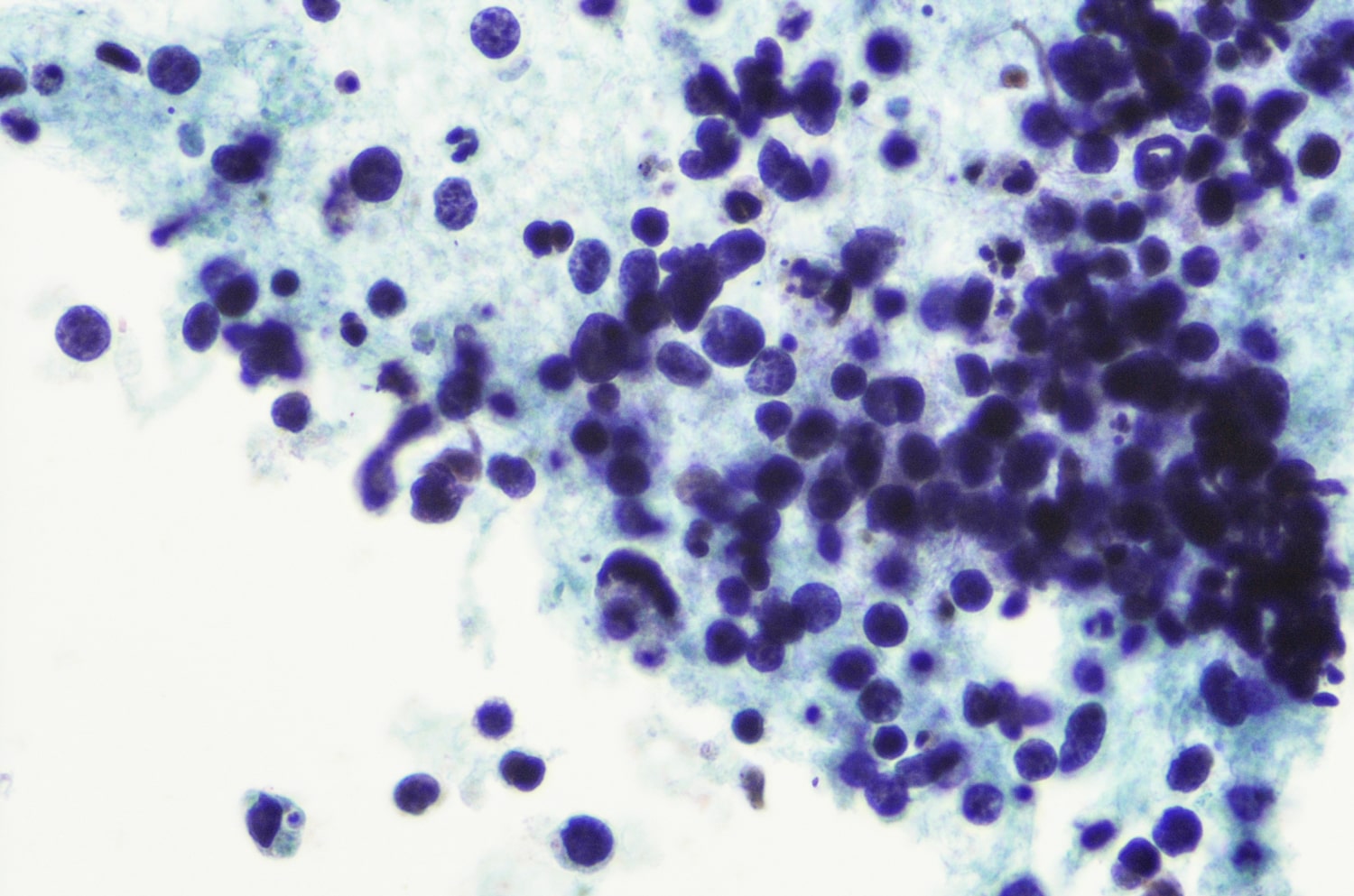
This 5-year project, funded under the Natural Sciences and Engineering Research Council's Discovery Horizons pilot program, supports interdisciplinary research that spans health, the natural sciences, engineering and the social sciences. Yoshua Bengio and UdeM’s Michael Tyers are joining their efforts to identify new antimicrobial peptides using machine learning. The World Health Organization (WHO) considers antibiotic resistance one of the most serious threats to global health. This project, which seeks solutions to a worldwide problem, fosters dialogue between AI and health researchers in order to incorporate AI into drug discovery.
This IVADO PRF3-funded 30-month research framework program is led by Yoshua Bengio with three other principal investigators from the fields of health and materials chemistry. Nine Mila faculty members (Sarath Chandar Anbil Parthipan, Doina Precup, David Rolnick, Pierre-Luc Bacon, Jian Tang, Simon Lacoste-Julien, Irina Rish, Guy Wolf and Mathieu Blanchette) and a number of academic researchers from different universities are involved in the program’s interdisciplinary projects. These projects aim to design algorithms through a series of iterative rounds of data gathering (from laboratory experiments and data simulators) and algorithm development for applications such as drug and material discovery.
Under the bilateral Bavaria-Quebec Artificial Intelligence in Health collaborative research program, Professor Julien-Cohen Adad of Mila and Polytechnique Montreal and his collaborator Mark Mühlau at the University of Munich have received 3-year funding for a project on multiple sclerosis diagnosis using MRI quantification of brain and spinal cord lesions. While medications are available to control the disease, each person responds differently and an individualized approach would be much more effective. This would require effective analysis of MRI images. The research team hopes to solve the problem by means of AI algorithms. This approach has the potential to help determine treatment efficacy and to predict the clinical course of the disease, all while strengthening Quebec-Bavaria relations.
On the Mila Blog: a strategic partnership between Mila and Relation Therapeutics for the discovery of synergistic drug combinations
Mila and Relation Therapeutics have been involved in a fruitful collaboration via the RECOVER project, funded in part by the Bill & Melinda Gates Foundation. Repeated experiments guided by sequential model optimization hone in on synergistic drug combinations active against a cancer cell line, requiring substantially less screening than an exhaustive evaluation. Read more.
Following the November 2021 symposium hosted by Mila, IVADO and CIFAR, four projects were selected to receive nearly $400,000 in funding to explore AI methods to generate synthetic imaging data while ensuring fidelity and patient privacy.
Among the selected projects, Mila researcher Christian Gagné, Full Professor at Université Laval and Canada CIFAR AI Chair, will be leading a project in partnership with the Régie de l’assurance maladie du Québec (RAMQ) on the generation of confidentiality-preserving synthetic data from administrative databases on prescription drug consumption for the analysis of drug use in the Quebec population.
AI and the environment
Discover how Mila researchers are exploring the implications of AI in the fight against climate change and some of the projects underway.

Professor David Rolnick is one of the lead authors of the report, “Climate Change and AI: Recommendations for Government Action,” commissioned by the GPAI and presented in November 2021 at COP26—the United Nations Climate Change Conference. The report includes 48 concrete recommendations for governments to address climate change, including a wide range of use cases.
As part of IVADO’s Strategic Research Funding Program, Mila professors Christopher Pal and David Rolnick, along with three other researchers from the Institut de recherche en biologie végétale and Université de Montréal, are leading a biodiversity and climate change research framework to provide researchers and practitioners with tools to combat biodiversity loss and the effects of climate change. Remote sensing technologies, such as phenocams or drones, offer the potential to study plant phenology and biodiversity in great detail, generating enormous amounts of data. The resulting data will enable the development of new algorithms grounded in the latest advances in computer vision and meta-learning to map plant species and their phenological signatures.

Diversity at the service of the community and science
EDI by design. AI by everyone. AI for everyone
Mila believes that diversity and inclusion are immense advantages for a community. In view of the barriers faced by underrepresented groups in the field of AI, it designs and implements innovative mechanisms to address these barriers and ensure strong participation by underrepresented groups in Mila and its broader ecosystem. Half of leadership positions at Mila are held by women and 5 out of 8 (62.5%) senior management positions are filled by women.
While AI attracts more men than women, Mila and its affiliated professors are determined to recruit members of underrepresented groups. In one year, the proportion of female research faculty has increased by 12% and now stands at nearly 22%.
Mila’s efforts to implement concrete actions, develop co-ownership and achieve meaningful impacts are organized around three pillars:
- Talent: Ensure strong participation by underrepresented groups in Mila and the broader AI ecosystem
- Culture: Incorporate EDI into our organizational practices, programs and institutional structure
- Knowledge: Promote diversity as a lever for innovation and play a leading role in countering research bias
Cybersecurity
In line with industry standards, Mila uses the ISO 27001 standard and the NIST cybersecurity framework. In 2021–2022, 23 dimensions covering the five strategic functions (identify, protect, detect, respond, recover) were examined. Mila's average maturity score was 1.2, which is comparable to that of other institutes. The target has been set at 3. To achieve it, Mila has prepared a 3-year roadmap including 9 initiatives.
The first initiative, which addresses the governance framework and the security operating model, has been completed. The training and awareness phase is in progress.
At the same time, the affiliated universities have initiated a similar process. Active collaboration ensures that the information security policies and practices of all these organizations are complementary.
Finance
Revenues

- Government grants
- Industry contracts
- Leasing
- Other
- Amortization of deferred contributions related to tangible capital assets
Total revenue:
31 102 090Expenses
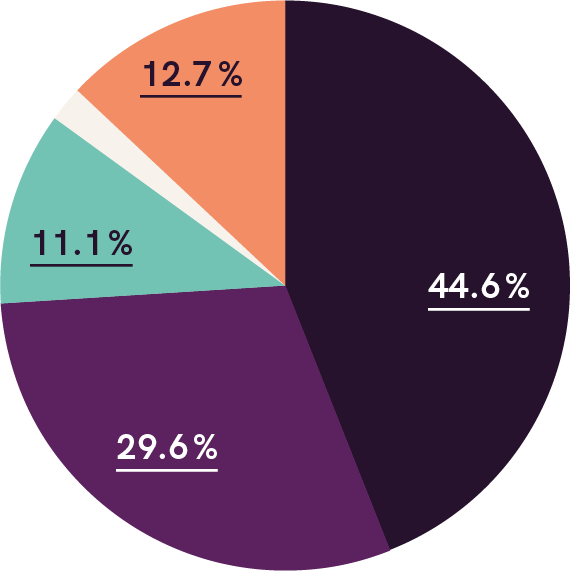
- Research
- Research support, innovation and computing power
- Projects, industry relationships and training
- Amortization of tangible capital assets
- General administration
Total expenses:
27 626 729Mission, values and strategic pillars
Our mission
Mila’s mission is to be a global pole for scientific advances that inspires innovation and the progress of AI for the benefit of all.
Our values
Mila’s values are the cornerstone of our vision and feed the DNA of our organization.
- Scientific Rigour & Excellence
- Sharing & Open Science
- Diversity, Equity & Inclusion
- Ethics & Social Conscience
- Democracy & Collegiality
- Collaboration & Transparency
- Academic Freedom
Our strategic pillars
AI Talent
Attract, develop and retain a diversified pool of talent recognized globally for their high-level expertise.
Cutting-edge Research
Achieve the highest levels of scientific leadership in AI development.
AI Adoption
Contribute to partnerships, projects and initiatives to accelerate the deployment and adoption of AI.
Social Influence
Develop perspectives on the potential of AI and the issues related to its use.




